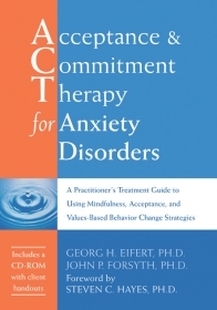|
PRAISE
“In a nuanced and creative inversion of traditional approaches to the treatment of anxiety, Eifert and Forsyth offer clients the possibility of relinquishing their struggles with anxiety, by “treating” the struggle as the problem and letting fear play out to an increasingly disinterested audience of one. Acceptance, commitment, and mindfulness are essential to this process, and this book clearly lays the type of experiential learning foundation that allows clients to embody these concepts and, through their actions, develop a new relationship with their fears. This book will certainly become a vital clinical resource for any therapist, student or educator in the field of anxiety disorders.” ~ Zindel V. Segal, PhD, the Morgan Firestone Chair in Psychotherapy and professor of psychiatry and psychology at the University of Toronto and author of Mindfulness-Based Cognitive Therapy for Depression “Eifert and Forsyth present the complexities and nuances of acceptance and commitment therapy for anxiety disorders in a fascinating and conceptually illuminating style and in a manner that is amply detailed to guide clinical practice. The principles that underlie acceptance and commitment therapy—to relinquish attempts to control internal states and instead focus upon valued life directions and goals—are brought to life with excellent case examples throughout their step-by-step guide for treating anxiety disorders. This book will be an invaluable resource for theoreticians and clinicians, novice and experienced alike.” ~ Michelle G. Craske, PhD, director of the Anxiety Disorders Behavioral Research Program at the University of California, Los Angeles and author of Origins of Phobias and Anxiety Disorders “Eifert and Forsyth have done something revolutionary! They have taken the treatment of anxiety disorders far beyond the disease model that CBT has been stuck in by brilliantly examining the core psychological processes that make fear and anxiety disordered and explaining in clear language what all anxiety disorders have in common. Their conceptualization of fear and anxiety demonstrates the cutting edge of clinical research and development within CBT and its development into the so-called third wave behavior therapies. The book contains innovative and user-friendly session-by-session guidelines on how to apply ACT for all the major anxiety disorders. This therapist guide should be on every clinical psychology program’s reading list. It is truly an eye opener and a huge step forward in how we view and treat the suffering associated with anxiety disorders.” ~ JoAnne Dahl, PhD, professor of clinical psychology at the University of Uppsala, Sweden, and author of Living Beyond Pain and Pain: A Vital Friend “Behavior therapy is undergoing extraordinary change. Mindfulness, acceptance, and values-oriented interventions are increasingly being included in interventions for a wide variety of problems in living. Eifert and Forsyth’s new anxiety text is a stunning example of the potential for this new wave of behavior therapies to remain connected to their scientific roots while exploring emerging treatment issues and technologies. This book is a must for the bookshelves of both clinicians and treatment developers. ~ Kelly G. Wilson, PhD, professor of psychology at the University of Mississippi and coauthor of Acceptance and Commitment Therapy: An Experiential Approach to Behavior Change, Mindfulness for Two, and When Things Fall Apart “This book provides concrete treatment guidelines that are firmly grounded in a new and intriguing approach to emotion regulation: Acceptance and Commitment Therapy. The authors are well known for their rigorous scientific studies and theoretical contributions to the field of anxiety disorders and behavior analysis. This book further demonstrates that they are highly skilled clinicians and masterful educators who are able to translate complex theories into simple and clearly formulated treatment techniques. The book is a reflection of the current paradigm shift from the studies of behaviors and cognitions to the study of and emotion regulation and, therefore, is a must-read for both the present and next generation of anxiety researchers.” ~ Stefan G. Hofmann, PhD, professor of psychology at the Center for Stress and Anxiety-Related Disorders at Boston University, and Editor of Cognitive and Behavioral Practice. “Acceptance and Commitment Therapy for Anxiety Disorders provides a detailed, step-by-step account of how therapists can use ACT to help people who are suffering from these problems. Its comprehensiveness and session-by-session guides will help people who are novices to this approach understand and apply the fundamentals of ACT. Experienced ACT practitioners will also find this an extremely valuable resource, as Eifert and Forsyth have deftly tailored core ACT techniques to target the primary issues of people with anxiety-related problems. In addition, this book provides a considerable amount of new and innovative, out-of-session exercises and materials clients can use to strengthen their commitment to move through their anxiety and lead a vital life that they will value. In all, it’s a one-stop-shop ACT guide for treating anxiety disorders.” ~ Frank Bond, BA, P.G.Dip., M.Sc., PhD, C.Psychol., ICTLHE, senior lecturer in the Department of Psychology at Goldsmiths College, University of London “This is an extremely useful book for professionals as well as educated clients. Focusing on the broad area of anxiety disorders, it does a superb job demonstrating how acceptance and commitment therapy can be applied to specific disorders. Avoiding the artificial constraints of DSM-IV or ICD-10 classifications of mental disorders, it emphasizes the functional similarities of the anxiety disorders and their common treatment strategies while at the same time taking into account some of their unique aspects.” ~ Rainer F. Sonntag, MD, psychiatrist and psychotherapist in private practice in Olpe, Germany “Eifert and Forsyth are interpreters rather than the creators of acceptance and commitment therapy (ACT). So when they explain its value for the treatment of anxiety, they ground their commitment to this approach in their own extensive clinical and research experience in anxiety disorders, not in uncritical acceptance. Because they really understand the psychology of anxiety, they have produced an authoritative, beautifully written, usable manual for clinicians. Calling it a manual, however, belies its theoretical sophistication and its ability to inspire rather than stipulate. These properties make it particularly useful in diverse cultural and global contexts, where it can easily be molded to the real lives of real clients.” ~ Ian M. Evans, PhD, professor emeritus and former head of the School of Psychology at Massey University in Palmerston North, New Zealand, fellow of the American Psychological Association and the Royal Society of New Zealand, and author of Nonaversive Behavioral Interventions |
(c) 2014 - 2016 Dr. John P. Forsyth | [email protected]


